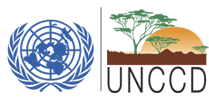The UN Convention to Combat Desertification (UNCCD) has published an 'Independent evaluation of the effectiveness of the Integrated Investment Frameworks,' which aims to assess the effectiveness of IIFs in supporting resource mobilization for sustainable land management (SLM).
Cambodia, Ethiopia, Honduras and Senegal were chosen as case studies for the evaluation.
 24 March 2015: The UN Convention to Combat Desertification (UNCCD) has published an ‘Independent evaluation of the effectiveness of the Integrated Investment Frameworks,’ which aims to assess the effectiveness of IIFs in supporting resource mobilization for sustainable land management (SLM). Cambodia, Ethiopia, Honduras and Senegal were chosen as case studies for the evaluation.
24 March 2015: The UN Convention to Combat Desertification (UNCCD) has published an ‘Independent evaluation of the effectiveness of the Integrated Investment Frameworks,’ which aims to assess the effectiveness of IIFs in supporting resource mobilization for sustainable land management (SLM). Cambodia, Ethiopia, Honduras and Senegal were chosen as case studies for the evaluation.
IIFs are, in general, part of broader processes that are supported by the Global Mechanism (GM) and aim to “leverage resources, with a view to increasing the effectiveness and impact of SLM interventions.” The report notes that, “Unlike the NAPs, IIFs are not requested in the UNCCD provisions.” IIFs aim to: identify SLM funding gaps; coordinate resource allocation; inform funding decisions and project development; be participatory in nature and “generate buy-in” of stakeholders during elaboration; and generate new funding interest and/or opportunities. They are an important element in the Ten-Year Strategy and in the GM’s support to countries. According to the report, they “promote a programme-based approach to SLM that supports alignment to country priorities, integration into the country budgeting processes, and donor coordination.” IIFs are dependent on a country’s willingness to prioritize SLM and focus on public spending.
The evaluation finds that the IIF participatory approach has had limited added value in generating new funding or opportunities, and that IIFs are a “better value for money” in countries where resources already exist or financial pledges have already been made. The evaluation notes that government leadership, ministerial capacity to develop bankable projects, a result-driven approach and an enabling economic climate are prerequisites for resource mobilization. It recommends that both the GM and affected countries, inter alia: revise the expectations around the IIFs objectives; ensure that work continues after the establishment of the IIF; and ensure closer alignment to NAPs and a stronger focus on result-based management in countries where IIFs are planned or have already been established.
The evaluation was prepared in advance of the 13th session of the Committee for the Review of the Implementation of the Convention of the UNCCD, meeting from 25-27 March 2015 in Bonn, Germany. [Publication: Independent evaluation of the effectiveness of the Integrated Investment Frameworks] [IISD RS Coverage of CRIC 13] [CRIC 13 Website]